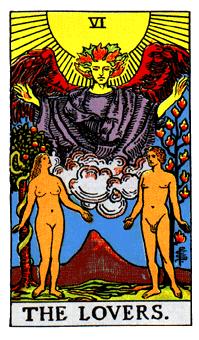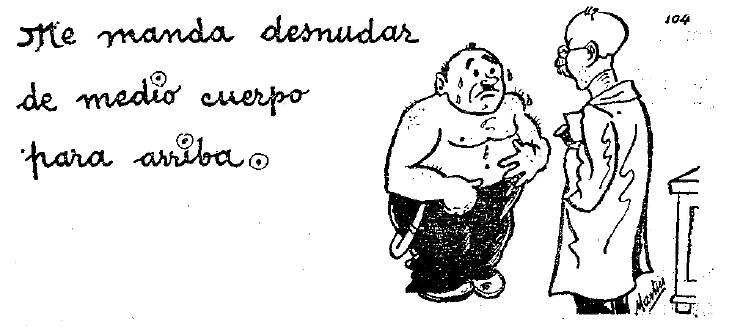
| Языки :: Испанский |
| Аудио |
 |
|
|
319 |
Español |
Spanish |
|
Lección Ciento cuatro (104) |
||
| Consultas baratas | Cheap medical advice. | |
| 1 | Tengo el estómago fastidiado y no hay más remedio que consultar con un especialista (1). | I have a ruined stomach and there is no other resource than consulting a specialist. |
| 2 | El Doctor Zeda es una notabilidad, pero cobra caro : 50 pesetas por la primera consulta y 25 por las sucesivas. | Doctor Zed is a celebrity but he takes a big sum : 50 p. for the first medical advice and 25 for the following. |
| 3 |
A ver si con un poco de ingenio me ahorro cinco duros (2) :
— Buenos días, doctor, ¿como sigue usted desde el otro día (3)? |
Let's see if, with a little ingenuity, I save 5 douros for me. — Good day, doctor, how do you do since the other day? |
| 4 |
Muy bien gracias, ¿y usted señor? — Pues sigo fastidiado : nada de apetito, no aguanto ningún alimento y siempre con calambres o sensación de quemadura en el estómago. |
Very well, thank you, and you, sir? — Well, I am still [continue] unwell; no appetite at all, I (can) bear no food, and I always have gnawing pains or a sensation of burning in the stomach. |
| 5 | El doctor me toma el pulso, me mira la lengua, me manda desnudar de medio cuerpo arriba, me ausculta y tritura el vientre (4), | The doctor feels [takes] my pulse, looks at my tongue, makes me undress down to the waist [from the waist upwards], sounds me and paws my belly, |
| 6 |
¿Qué le parece, doctor? — Está usted lo mismo que la última vez. — ¿Y qué me receta usted, doctor (5) 7 |
What does it seem to you, doctor? — You're like [the same as] the last time. — And what do you prescribe for me, doctor? |
| 7 |
Pues lo mismo que la última vez : siga usted con el mismo tratamiento. |
Well, the same thing as the last time; continue [with] the same treatment. |
| 8 |
Muchas gracias, doctor, ¿y cuanto le debo? — Cincuenta pesetas, igual que la primera vez. — ... Me fastidió. |
Thank you very much, doctor, and how much do I owe you ? — 50 pesetas as [equal as] the last time... He tricked me. |
| 9 |
— ¡Cuánto me alegro de verle, doctor! — ¿Qué pasa? |
How glad I am to see you, doctor! — What happens? |
| 10 | Estoy mal, me duele la cabeza, me duele la garganta (6), tengo ahogos, no hago más que sonarme, toser y escupir. | I am unwell, I have a headache, a sore throat, choking sensations, I do nothing but blow my nose, cough and spit. |
| 11 |
Ya se ve : usted tiene un catarro. — Eso pensaba yo; ¿y qué hace usted, doctor, cuando está acatarrado (7) ? |
I see what it is [it already seen], you have a cold- — That's what I thought; and what do you do, doctor, when you have a cold? |
| 12 | Pues lo que usted : me sueno, toso y escupo. | Well, just what you (do) : I blow my nose, cough and spit |
| EJERCICIOS | EXERCISE : | |
| La moda femenina (continuación). | Ladies' fashion (continued). | |
| 1 |
— Telas. — El tafetán triunfe entre los
demás tejidos de actualidad: |
Materials. Taffeta triumphs over all fashionable materials : velvet, tulle, shining and supple satin, marocain of austere dullness, and gorgeous, metallic fabrics : moaré, lamé, silver woven linen-cloth, gold woven velvet, which appear or come up again as a reaction against the vaporous modesty of organdí and other cotton materials. |
| 2 |
Sombreros. — Para los sombreros, la moda es muy
ecléctica : todas las formas se admiten. Pero la boina y el sombrerito de ala acampanada quedan favoritos. |
Hats. — For hats, the fashion is very eclectic. All shapes are admitted. But the beret and the small cloche remain the favourites. |
| 3 |
— Si tiene usted un fieltro todavía
presentable, muy fácilmente puede sacar partido de él. Colóquele usted, donde mejor Ie parezca, dos alas, una pluma o un pájaro de fantasía todo ello de color distinto al del sombrero. |
If you possess a still presentable felt hat, you can very easily make
use of it. Add to it, at the place which will seem best to you, two wings, a feather or a fancy bird, all (things) of a different colour from that of the hat. |
| 4 |
Guantes. — Siguen llevándose guantes largos o cortos de hilo, de encaje y de cabritilla con puños de piel. |
Gloves, — Ladies still wear long or short cotton, lace or kid gloves with fur cuffs. |
| 5 | La última novedad son los guantes largos de terciopelo; su color ha de hacer juego con el vestido. | The latest novelty is the long velvet gloves; their colour must be matched with that of the dress. |
| NOTES. | |
| 1 |
Fastidiado, dilapidated, broken down. |
| 2 |
Me ahorro cinco duros, I save 5 douros. |
| 3 | The phrase "como sigue usted" is addressed to a person that we have already seen : how do you (continue) to do? |
| 4 |
De medio cuerpo arriba, liter. : from mid-body upwards.
The adverb of place, put after a word, implies a direction, that word being taken as a starting point : ir río arriba, to go upstream [from the river upwards]; río abajo, downstream; camino adelante, ahead. |
| 5 | Recetar, to prescribe; write down a prescription (una receta). |
| 6 |
Me duele, liter. : hurts me, from the verb doler.
This verb is used like gustar, the subject being an organ, a part of the body : I have a sore throat, my throat hurts me, la garganta me duele. If the cause is exterior, translate to hurt by : hacer daño, to do harm : the unripe apples made me ill, did me harm, las manzanas verdes me hicieron daño. |
| 7 |
Un catarro : a cold in the chest. |
